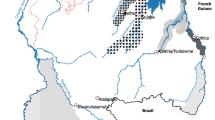Abstract
The time is here for archaeologists to step up to the role of enabling communities to have a meaningful collaboration with our research. The papers in this volume exemplify this ability for archeologists to full engage with descendant communities to create projects that are applicable to the people whose identity is impacted by our work This paper takes the opportunity to comb through the methods presented in these case studies and develop a set of criteria by which the goal of community engagement can be had.


Similar content being viewed by others
References
Agbe-Davies, A. S. (2010). Concepts of community in the pursuit of an inclusive archaeology. International Journal of Heritage Studies 16(6): 373-389.
Battle-Baptiste, W. (2011). Black Feminist Archaeology. Left Coast Press, Walnut Creek, CA.
Battle-Baptiste, W. (2017). Cruise ships, community, and collective memory at Millars Plantation, Eleuthera, Bahamas. Historical Archaeology 51(2):60-70.
Blakey, M. L. (1997). Past is present: comments on “In the realm of politics: prospects for public participation in African-American plantation archaeology.” Historical Archaeology 31(3):140–145.
Blakey, M. L. (2020). Archaeology under the blinding light of race. Current Anthropology 61(S22):183-197.
Bollwerk, E., Connolly R., and McDavid, C. (2015). Co-creation and public archaeology. Advances in Archaeological Practice 3(3):178-187.
Chambers, E. (2004) Epilogue: archaeology, heritage, and public endeavor. In Shackel, P. A. and Chambers, E. J. (eds.), Places in Mind: Public Archaeology as Applied Anthropology. Routledge, New York, pp. 193-208.
Dawdy, S. L. (2009). Millennial archaeology: Locating the discipline in the age of insecurity. Archaeological Dialogues 16(2):131-142.
Flewellen, A., Odewale, A., Dunnavant, J., Jones, A., and White W. A. III. (2021). Creating community and engaging community: the foundations of the Estate Little Princess Archaeology Project. International Journal of Historical Archaeology. https://doi.org/10.1007/s10761-021-00600-z
Franklin, M. and Lee, N. (2020). African American descendants, community outreach, and the Ransom and Sarah Williams Farmstead. Journal of Community Archaeology and Heritage 7(2):135–148.
Fryer, T. and Diserenes Morgan, K. (2021). Heritage activism in Quintana Roo, Mexico. In Barton, C. P. (ed.), Trowels in the Trenches: Archaeology as Social Activism. University of Florida Press, Gainesville, Florida, pp. 81-107.
Furlong Minkoff, M., Brock, T. P., and Reeves, M. (2021). Aiming for anti-racism: policies and practices of a publicly engaged archaeology department. In Westmont, V. C. (ed.), Critical Public Archaeology: Confronting Social Challenges in the 21st Century. Berghahn Books, New York.
González-Ruibal, A. (2018). Ethics of archaeology. Annual Review of Anthropology 47:345-360.
Hartemann, G. O. (2021). Unearthing colonial violence: Griotic archaeology and community-engagement in Guiana. International Journal of Historical Archaeology. https://doi.org/10.1007/s10761-021-00596-6
James Madison’s Montpelier (2018). Engaging Descendant Communities in the Interpretation of Slavery at Museums and Historic Sites: A Rubric of Best Practices Established by the National Summit on Teaching Slavery. James Madison’s Montpelier, Orange. <https://www.montpelier.org/learn/tackling-difficult-history>; accessed May 2021.
Little, B. and Shackel, P. (2014). Archaeology, Heritage, and Civic Engagement. Left Coast Press, Walnut Creek, CA.
McDavid, C. (2002). Archaeologies that hurt; descendants that matter: A pragmatic approach to collaboration in the public interpretation of African-American archaeology. World Archaeology 34, 303–314.
McDavid, C. and Brock, T. (2015). The differing forms of public archaeology: where we have been, where we are now, and thoughts for the future. In Gnecco, C. and Lippert, D. (eds.), Ethics and Archaeological Praxis. Springer, New York, pp. 159-183.
Mignolo, W. (2012). Local Histories/Global Designs: Coloniality, Subaltern Knowledges and Border Thinking. Princeton University Press, Princeton, NJ.
Murray, T. (2011). Archaeologists and Indigenous people: a maturing relationship? Annual Review of Anthropology 40:363–378.
Shackle, P. A. (2004). Introduction: working with communities: heritage development and applied archaeology. In Shackel, P. A. and Chambers, E. J. (eds.), Places in Mind: Public Archaeology as Applied Anthropology. Routledge, New York, pp. 1-18.
Shackel, P. A. (2008). Memory studies in historical archaeology: introduction. SAA Archaeological Record 8(1):10-12.
Shackel, P. A. and Chambers, E. J. (eds.) (2004). Places in Mind: Public Archaeology as Applied Anthropology. Routledge, New York.
Stottman, J. (ed.) (2010). Archaeologists as Activists: Can Archaeologists Change the World? University of Alabama Press, Tuscaloosa.
Acknowledgments
The author is indebted to Camile Westmont and Elizabeth Clay for inviting him to participate in the 2020 SHA session that was the origin for these papers. He also appreciates the feedback and edits the same editors of this volume provided his paper. Thanks is also extended to Terry Brock and Carol McDavid for their feedback and comments. Thanks to all the authors within this volume for their inspiring projects and taking the time to record the interaction they had with descendant communities whom they engaged with their research.
Author information
Authors and Affiliations
Corresponding author
Additional information
Publisher’s Note
Springer Nature remains neutral with regard to jurisdictional claims in published maps and institutional affiliations.
Rights and permissions
About this article
Cite this article
Reeves, M.B. Building a Methodology for Community-based Archaeology of People of the African Diaspora: Thoughts on Case Studies. Int J Histor Archaeol 26, 242–257 (2022). https://doi.org/10.1007/s10761-021-00614-7
Accepted:
Published:
Issue Date:
DOI: https://doi.org/10.1007/s10761-021-00614-7




